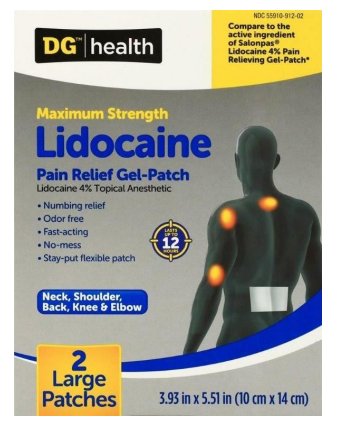DG Health Lidocaine Patches Don’t Hold Up, Class Action Claims [DISMISSED]
by Erin Shaak
Last Updated on February 9, 2026
Hodorovych v. Dollar General Corporation
Filed: June 29, 2022 ◆§ 1:22-cv-03415
A class action claims DG Health-brand lidocaine patches are falsely advertised in that they peel off well before providing “up to 12 hours” of pain relief.
Illinois
June 19, 2023 – Dollar General Lidocaine Patches Class Action Tossed by Federal Judge
The proposed class action lawsuit detailed on this page was dismissed without prejudice on May 23, 2023.
Want to stay in the loop on class actions that matter to you? Sign up for ClassAction.org’s free weekly newsletter here.
On May 23, United States District Judge Sharon Johnson Coleman ruled in favor of Dollar General, closing the case with a nine-page opinion and order in which the court granted the defendant’s motion to dismiss the suit.
In her opinion and order, the judge sided with the arguments presented by the company in its October 2022 motion to dismiss, calling the plaintiff’s claims “vague” and stating that the consumer failed to adequately allege actual damage or violations of the Illinois Consumer Fraud and Deceptive Business Practices Act (ICFA).
The judge said in the order that “nothing on the [lidocaine patches’] label is deceptive within the meaning of the ICFA.” Specifically, Judge Coleman noted that no reasonable consumer would assume that a patch purported to remain in place for “up to 12 Hours” would last for no less than that.
Likewise, the judge determined that there is no deception in the “Maximum Strength” claim, saying that, “[much] like a reasonable consumer would not expect ‘maximum strength’ Tylenol to perform similarly to a prescription-strength painkiller containing codeine or morphine, consumers certainly would not expect [over-the-counter] lidocaine patches to perform at the same level as a prescribed drug.”
Further, Judge Coleman dismissed the plaintiff’s allegation that the front-label statement “Numbing Relief” is misleading, citing a disclaimer on the product’s label that notes that the patches “[t]emporarily relieve[] minor pain.”
Though the case was terminated on May 23, the judge’s order grants the plaintiff 30 days to request permission to file an amended complaint or the suit will convert to a dismissal with prejudice.
Get class action lawsuit news sent to your inbox – sign up for ClassAction.org’s free weekly newsletter here.
A proposed class action claims that Dollar General’s DG Health-brand lidocaine patches are falsely advertised in that they peel off well before providing “up to 12 hours” of pain relief.

The 15-page lawsuit alleges that although Dollar General Corporation advertises its private label lidocaine patches as “maximum strength” and able to provide “fast-acting,” “numbing relief” in the form of a “stay-put flexible patch,” these representations are misleading given the patches fail to properly adhere to a wearer’s skin.
“While certain companies innovated their technology based on clinical studies to ensure that their lidocaine patches reliably adhere to a consumer’s body, even while exercising, upon information and belief, Defendant has not,” the complaint contends. “The claims that the Product ‘LASTS UP TO 12 HOURS’ and is a ‘Stay-put flexible patch’ are misleading because it regularly peels off the bodies of users within a few hours, and often minutes, after being applied.”
The case argues that Dollar General has sold more of the DG Health lidocaine patches, and at higher prices, than it would have absent the allegedly misleading representations regarding how much pain relief each patch would provide.
The suit relays that according to FDA reports, roughly 70 percent of consumer complaints about lidocaine patches, which are typically marketed as able to provide pain relief through a topical anesthetic applied to the skin via a patch, are related to poor adhesion. Per the case, Dollar General has used “the same outdated and defective adhesion technology” shown to be ineffective in generic prescription lidocaine patches.
The lawsuit argues that although consumers are led to expect that the DG Health lidocaine patches will provide at least 12 hours of pain relief, they routinely fail to deliver the “maximum strength” amount of lidocaine for the full 12 hours due to poor adhesion.
According to the case, proper adhesion is “crucial” for patches that deliver a topical product given the dosage is compromised when the patch lifts off the skin.
The suit argues that because the DG Health lidocaine patches often detach from a wearer’s skin soon after application, Dollar General’s claims that they can provide “maximum strength” lidocaine and “numbing relief” are false. Moreover, the case alleges that the numbing relief claim, which consumers associate with “medical treatments requiring a prescription,” is inconsistent with the lidocaine patches’ limited FDA approval to “[t]emporarily relieve[] minor pain.”
The lawsuit looks to represent anyone in Illinois, Virginia, Montana, Wyoming, Idaho, Alaska, Virginia, West Virginia, Kansas, Nebraska, North Dakota, Iowa, Mississippi, Arkansas, South Carolina or Utah who purchased the DG Health lidocaine patches during the applicable statute of limitations.
Get class action lawsuit news sent to your inbox – sign up for ClassAction.org’s newsletter here.
Video Game Addiction Lawsuits
If your child suffers from video game addiction — including Fortnite addiction or Roblox addiction — you may be able to take legal action. Gamers 18 to 22 may also qualify.
Learn more:Video Game Addiction Lawsuit
Depo-Provera Lawsuits
Anyone who received Depo-Provera or Depo-Provera SubQ injections and has been diagnosed with meningioma, a type of brain tumor, may be able to take legal action.
Read more: Depo-Provera Lawsuit
How Do I Join a Class Action Lawsuit?
Did you know there's usually nothing you need to do to join, sign up for, or add your name to new class action lawsuits when they're initially filed?
Read more here: How Do I Join a Class Action Lawsuit?
Stay Current
Sign Up For
Our Newsletter
New cases and investigations, settlement deadlines, and news straight to your inbox.
Before commenting, please review our comment policy.